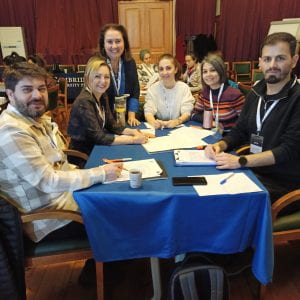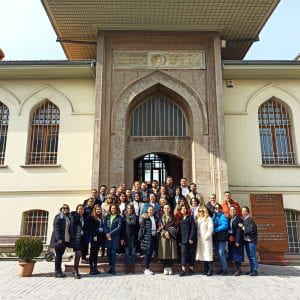Reflection: Language Testing and Assessment Course by Olcay Ergülü
Gordion Academy recently held a Language Testing and Assessment Course from the 22nd to the 24th of February at the Topkapı Campus of FSM University. This three-day event was attended by 36 instructors from various private universities who sought to gain a comprehensive understanding of the main principles of language assessment. The course was expertly facilitated by Zeynep Ürkün from Kadir Has University, who focused on theoretical and practical issues in English language assessment, particularly with regard to receptive skills.
 On the first day of the course, we engaged in a deep and thoughtful discussion on the key issues of assessment reliability and practicality within the scope of institutional expectations. After sharing our individual experiences and ideas in small groups, we had the opportunity to analyze and evaluate the different approaches adopted by various universities. As a result of these discussions, we identified that the organizational aspect of assessment and testing is vital in order to execute a smooth process. In an ideal organizational structure, all parties involved in the process should be aware of their roles, clear standards should be set, and there should be meaningful assessment tasks appropriate for the exit level expectations. Furthermore, it was emphasized that a test should be proofread by multiple parties, as assessment is not a solitary activity.
On the first day of the course, we engaged in a deep and thoughtful discussion on the key issues of assessment reliability and practicality within the scope of institutional expectations. After sharing our individual experiences and ideas in small groups, we had the opportunity to analyze and evaluate the different approaches adopted by various universities. As a result of these discussions, we identified that the organizational aspect of assessment and testing is vital in order to execute a smooth process. In an ideal organizational structure, all parties involved in the process should be aware of their roles, clear standards should be set, and there should be meaningful assessment tasks appropriate for the exit level expectations. Furthermore, it was emphasized that a test should be proofread by multiple parties, as assessment is not a solitary activity.
On the second day, the focus was primarily on reading assessment. We delved into the question of how reading questions can test a student’s reading ability and engaged in a hands-on activity within our respective groups. Through this experience, we concluded that it is not feasible to create a plethora of questions in short texts, and certain question types, such as “guessing the meaning from the context” and “true or false” questions are not conducive to testing higher-level reading abilities.
 The last day of the course was dedicated to listening assessment. There were two key points of discussion on how to assess listening comprehension. Zeynep Ürkün highlighted that the difficulty of reading and listening exams at any level should not be identical, as it is an extra challenge to listen to a text. Consequently, listening exam difficulty should be lower than the reading component. Although listening comprehension is viewed as an extra challenge, it is suggested that a listening exam text should only be listened to once at all levels to test listening comprehension in a more natural manner.
The last day of the course was dedicated to listening assessment. There were two key points of discussion on how to assess listening comprehension. Zeynep Ürkün highlighted that the difficulty of reading and listening exams at any level should not be identical, as it is an extra challenge to listen to a text. Consequently, listening exam difficulty should be lower than the reading component. Although listening comprehension is viewed as an extra challenge, it is suggested that a listening exam text should only be listened to once at all levels to test listening comprehension in a more natural manner.
This three-day training provided me with an excellent opportunity to meet and exchange ideas with other professionals in the field of testing and assessment. It was enlightening to discover the approaches and experiences of other institutions. Overall, I was delighted to see that we had already taken significant steps to organize the way we administer assessments and had already achieved standardization in most of the key areas discussed and evaluated during these three days.

Leave a Reply